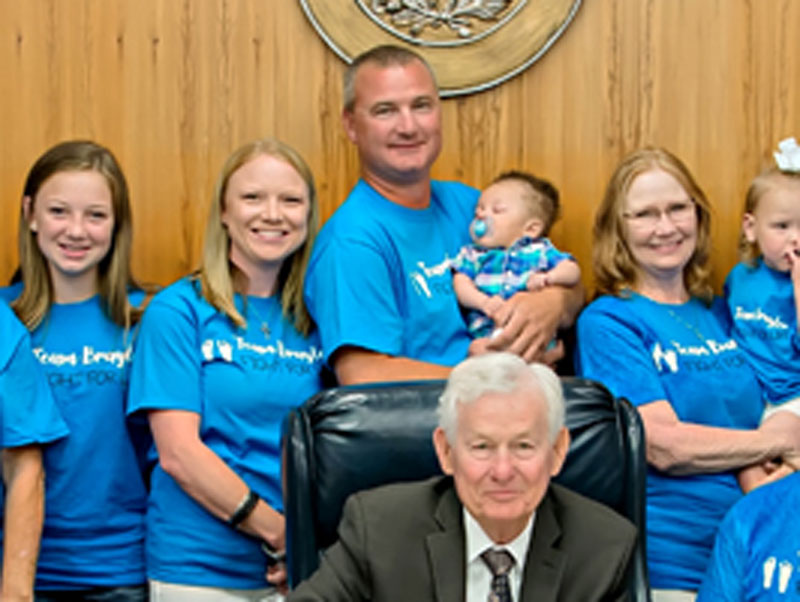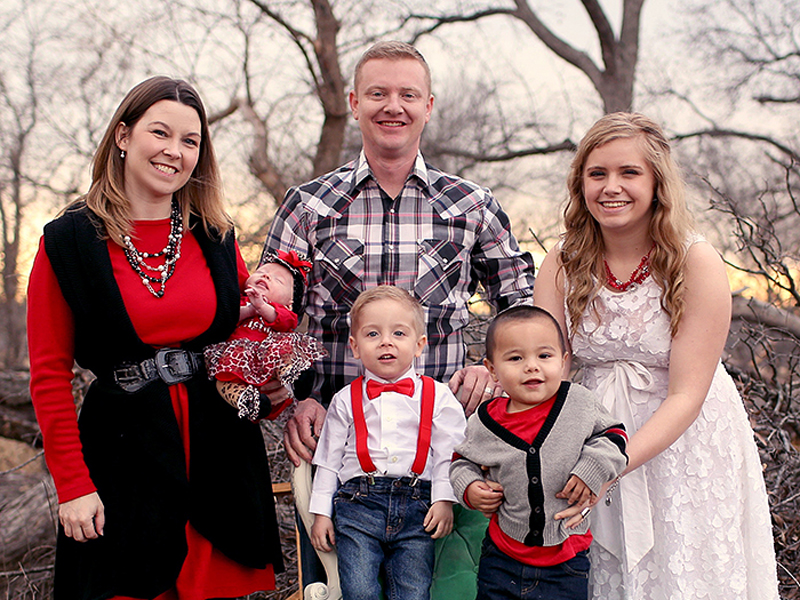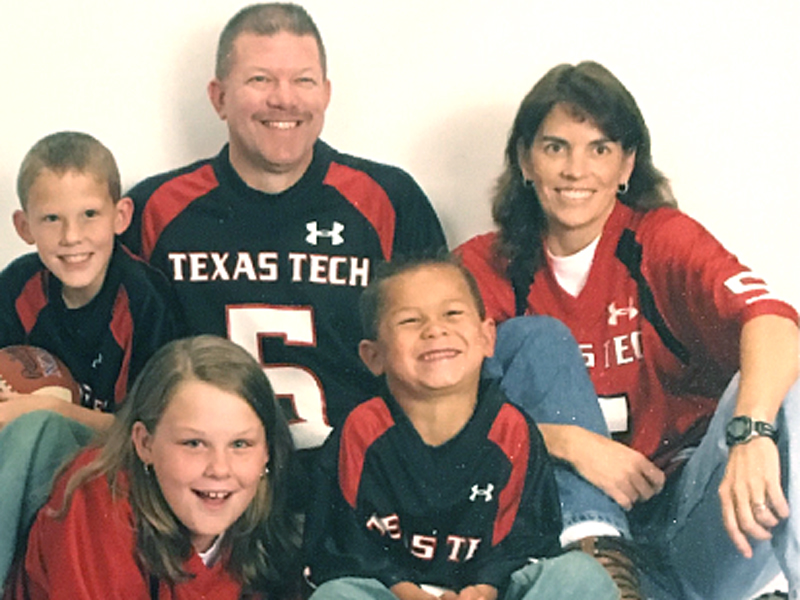The medical staff at the hospital said the newborn wouldn’t live for more than a couple of weeks. But they hadn’t met the tenacious Tiffany Ross yet.
Tony and Tiffany Ross had married very young, but they stuck together through the struggles, and reached the point where they were content and happy with their lives. Tony had a good job, they had a nice house, and Tiffany was a stay-at-home mom raising their three kids.
In obedience to God’s calling to foster children in need, Tony and Tiffany have fostered about 25 kids over the years. “We both agreed, we don’t need a bigger family, we don’t want a bigger family,” said Tiffany. “We are fostering. That’s our ministry. That’s what God has called us to do.”
They understood their role was to take in broken children with various limitations, do what was necessary to see them healed and whole, and transition them to their forever adoptive home. But through a series of signs they couldn’t ignore, God changed their ministry to include adoption.
Tony and Tiffany have since adopted Joshua now four years-old, and Gracelyn now 3 years-old. Because of state regulations, another adoption would close their home to foster care. Since they wanted to continue fostering, Tony and Tiffany weren’t planning to adopt again. Not until a series of miracles indicated there was one more child who desperately needed them.
Tiffany was convinced that God wanted them to foster a child who had been diagnosed with a terminal condition. On a Friday, while driving to a couple’s retreat, she called Arrow’s State Director of Health Care Services Sharon Kiely to ask if there was a need for a foster home like that. Sharon told her there wasn’t that need right now, but if God was speaking to her heart, He was preparing her. Since Tony had not received the same message, Tiffany asked Sharon to pray for them as they considered taking in a child and loving on them during their last days.
The very next day, a little boy who was scheduled to be adopted was born in Amarillo, Texas, but because of a defect, the doctors didn’t expect Braylen to live more than a couple of weeks. Of course, the adoption agency backed out of the planned adoption. And two days later, Braylen’s mother abandoned him at the hospital.
The very next day, 650 miles away in Beaumont, Texas, Tony lets Tiffany know he also has heard from God, and they need to prepare to minister to a terminally ill child.
The very next day, Child Protective Services calls Sharon at Arrow asking about a possible home for Braylen. Sharon immediately called Tiffany. Tiffany responded, “Yes! Yes! Yes!”
The very next day, the medical staff, social services staff, along with Tiffany and Tony conferred on Braylen’s condition. It was decided that Tiffany would fly to Amarillo to bring Braylen back to Beaumont.
The very next day, exactly one week after calling to ask about the need for families to foster terminal children, the CPS supervisor and case worker picked up Tiffany at the Amarillo airport, and took her directly to the hospital. Shortly after arriving, Tiffany shared contact information for the Texas Children’s Comprehensive Care Clinic in Houston. The nurse called the clinic to schedule an appointment for Braylen when they were back home. Normally, an appointment wouldn’t be available for weeks to months, but the clinic was able to see Braylen as soon as they returned, first thing Monday morning at 9:00 am.
Tiffany spent the night with Braylen, and it couldn’t have gone better. Braylen had not been able to finish a full bottle of formula and was being fed through an NG tube. But through the night, and into the next morning, Tiffany was able to get Braylen to take four full bottles. The doctors ordered the NG tube removed.
The very next day, Tiffany and Braylen spent time cuddling and getting to know each other. The connection was instantaneous, Tiffany completely fell in love with this little miracle. Before they left the hospital, the doctor told Tiffany that even though they initially thought Braylen would not be able to survive for more than a couple of weeks at the most, now they really weren’t sure because of his incredible response to Tiffany.
Later that day, when Tiffany arrived at the airport, she noticed things seemed strangely quiet, especially since it was the Christmas season. No people coming or going. The airport seemed almost deserted. As she walked down the hallway with Braylen in her arms, she began to hear singing. She turned and looked into a glass room, and there she saw the back of a choir on risers. They were singing about the newborn Christ-child, “Away in a Manger.”
At the ticket counter, the agent mentioned how precious and tiny Braylen was, and Tiffany responded by telling the agent she was concerned that the flight might be painful for Braylen. The agent assured her that he would be fine. Prior to take off, the pilot and another crew member came back to Tiffany’s seat to talk with her. They understood Braylen had just come from the hospital and that she was concerned about the effects of altitude pressure. The pilot explained that he found a lower altitude that they were cleared for, so he would be able to fly at a level that would have the least possible impact on Braylen. Then the pilot escorted Tiffany and Braylen to first class.
As they flew home through the dark, Tiffany looked down at the clouds and watched a beautiful glowing light below the clouds that led them on their way home.
At Braylen’s Monday morning doctor’s appointment, the prognosis was the same. Braylen had Hydranencephaly and was still considered terminal, with no prediction on how long he might survive.
Within the first month, Braylen’s head started growing exponentially. It surpassed the second and third percentile, and continued to grow until it was no longer measurable for his age category.
Braylen desperately needed surgery to relieve the building pressure in his head, but the earliest the surgeon would attempt it would be at the age of six to nine months. Braylen was 1 month old.
“Braylen was in such pain, he would scream day and night,” Tiffany said. “I stayed with him during the day until Tony came home at 5:00 or 6:00 and I would sleep until midnight. Then I’d stay up all night with Braylen while Tony slept. Tony would go to work in the morning and we’d do the same thing all over again.”
The situation finally escalated to the point where Tony and Tiffany had to take Braylen to the emergency room. While they were waiting for all the consults, Braylen started sundowning. Changes in his condition were changing so rapidly, the hospital admitted them.
The surgeon and two teams examined Braylen and came to the conclusion that Braylen’s discomfort wasn’t from increased intracranial pressure, but was just acid reflux. They put him on Tylenol around the clock and anti-reflux medication. Tiffany wasn’t buying it. She told them, “We’re not going home until we have a happy baby.”
After Tony and Tiffany spoke with another doctor, and after getting patient advocates involved, the surgeon finally agreed to put in a shunt to relieve the intracranial pressure.
When the doctor came out of surgery to let Tiffany and Tony know how the surgery went, he told them that when they pierced the membrane in Braylen’s head, there was quite a bit of pressure that was released. Tiffany thanked him for acknowledging and confirming her diagnosis.
“Braylen was a completely different kid,” said Tiffany. “He was happy. His head growth reverted to a normal growth rate. But even though the procedure brought relief, Braylen still had the looming ‘terminal’ label.”
At their next follow up visit with the surgeon, Tony and Tiffany meet with a palliative care team, who would help keep Braylen comfortable as the end of life came near. They also encourage Tony and Tiffany to prearrange funeral services, which they did. And then they consulted with the Gift of Life team about organ donation.
But Tiffany wasn’t ready to give up. She had been researching online, and found a place in Philadelphia that worked with brain injured kids. On the website, she read family testimonials, she watched videos that demonstrated the progress achieved by patients. Encouraged, Tiffany reached out to them, but never heard back.
While making funeral arrangements, Tiffany was asked if she wanted a burial or cremation. Fighting back the tears, she said she just couldn’t make that decision right then. Then her cell phone rang.
The caller ID on her phone said Philadelphia. Tiffany thought to herself, “Is this somebody calling about my student loans again, or is this actually what I pray it could be?”
After everyone left, she ran outside to a quiet spot and returned the call. It was the team at the Institute for the Achievement of Human Potential. Tiffany knew right at that very moment, God was saying, “Don’t give up hope yet.”
Tiffany explained Braylen’s condition, and the response was “That’s great! Let me tell you how we can help and you can see if that works for you.”
Tiffany breathed a prayer, “God, you didn’t give me a kid that was hopeless, you gave me a kid that I could fix. I just didn’t know it at the time.”
The Philadelphia team is currently overseeing Braylen’s intensive treatment program and working with the doctors at Texas Children’s Hospital, but it’s Tony and Tiffany who are administering Braylen’s daily therapy. They send the team videos of Braylen’s progress so adjustments in therapy can be made if necessary. And right now, Braylen is doing remarkably well.
Tony and Tiffany had a big decision to make. Do they continue to foster Braylen, or adopt Braylen giving him a forever family, but at the same time creating a “full house” which closes their home to fostering any more kids.
They had come too far with Braylen. He was already their son. Now they just needed to make it official. So on June 1st, the family celebrated the consummation of Braylen’s adoption. Their new son joined his other five siblings in completing the Ross family. Tony and Tiffany expressed their appreciation to everyone that helped them on their journey in the following note:
“We want to take a moment to say a HUGE thank you to everyone for their help, thoughts, and prayers! Today was a landmark day in Baby Braylen’s Journey as he was “officially” adopted into our family! A day, early on, we weren’t sure he’d live to see, but God clearly has big plans for our little man!
“It was so beautiful to see everyone who came out to support us today! What an emotional experience… adoption is a little like the birth experience in the sense that emotions are high and the love for your baby is overwhelming! But it’s also a bit like a wedding, where everyone is there to witness as you vow before God and the court to raise that child as if he were born from our own bodies. The magnitude of that responsibility is so great, yet it’s such an easy thing to commit to!
“Braylen is such a huge part of our lives and the love we have for him has taken over our hearts so much that it really feels like he was born from my body…adoption is definitely a God thing! And we’re so blessed and honored He chose us to be Baby Braylen’s mom and dad!!!”
Tony & Tiffany Ross




 Finally, through Vaughn’s adoption at 15 months old, this loving couple had become what they prayed for…a loving family. But the Maiers were about to experience Ephesians 3:20 which says that God “is able to do immeasurably more than all we ask or imagine, according to his power that is at work within us…”
Finally, through Vaughn’s adoption at 15 months old, this loving couple had become what they prayed for…a loving family. But the Maiers were about to experience Ephesians 3:20 which says that God “is able to do immeasurably more than all we ask or imagine, according to his power that is at work within us…” In December 2014, Ashlyn’s adoption was finalized, and the state dropped Jace’s case since he and his mom were now in a stable home environment. Not only did Valarie and Evan have Ashlyn as a new daughter, but they also had Jace as a new grandson. But the biggest surprise of all happened just three months earlier when Valarie gave birth to their newest daughter, Meridian. With three kids under three-years-old, “It was a party at our house all the time,” said Valarie.
In December 2014, Ashlyn’s adoption was finalized, and the state dropped Jace’s case since he and his mom were now in a stable home environment. Not only did Valarie and Evan have Ashlyn as a new daughter, but they also had Jace as a new grandson. But the biggest surprise of all happened just three months earlier when Valarie gave birth to their newest daughter, Meridian. With three kids under three-years-old, “It was a party at our house all the time,” said Valarie. Today, Ashlyn is a high school graduate, she is employed, and Jace is in school, and they have their own apartment. The desire of Ashlyn’s heart is to help other kids who go through the same type of turmoil she has overcome, so she is currently considering her college options in order to pursue a career in counseling.
Today, Ashlyn is a high school graduate, she is employed, and Jace is in school, and they have their own apartment. The desire of Ashlyn’s heart is to help other kids who go through the same type of turmoil she has overcome, so she is currently considering her college options in order to pursue a career in counseling.


 With few homes available for foster children over 12 years old, especially older foster teens, the future holds little promise of the type of future most 18 year-olds look forward to according to the results of the 2011 Midwest Study from Chapin Hall at the University of Chicago.
With few homes available for foster children over 12 years old, especially older foster teens, the future holds little promise of the type of future most 18 year-olds look forward to according to the results of the 2011 Midwest Study from Chapin Hall at the University of Chicago.

 Recently Misty and Randy Bailey adopted Hagen after fostering him for nearly three years. During their journey, the Baileys faced every possible emotional and physical challenge any home could possibly take.
Recently Misty and Randy Bailey adopted Hagen after fostering him for nearly three years. During their journey, the Baileys faced every possible emotional and physical challenge any home could possibly take.




